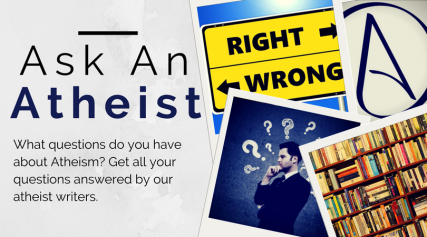What do you want to ask an Atheist? Fill out the form below or submit your question online.
By Jim Downard
I am a long time “atheist” from central California. Thank you for considering my question.
We often hear in the news these days that Christian and even Muslim persecution is on the rise in places like China, North Korea, and the Middle East. Let me be clear from the outset and say that in no way whatsoever do I condone the persecution of individuals for their religious beliefs. I am ashamed to admit that a dear atheist friend of mine actually thought it a good thing that these countries were sending a message to Christian and Muslim theists. “About time they resist that insidious virus. Good for them” were his exact words at a private party. My heart sank. I needed to correct my friend, and I needed to do so in the presence of everyone who heard him utter those thoughtless words for fear even one of them might walk away believing there was merit in what he said. So I gently and somewhat tactfully reminded him that atheists were once persecuted in Europe as well, and they are still persecuted today in places like the Middle East. I had also reminded him that persecution often emboldens and strengthens theism, especially Christianity. They typically view it as a sign of fulfilled prophecy, and so far from weakening it, these persecutions strengthen and proliferate it. The only weapon is education not force.
He took it quite well and I’m happy for that. Do you think I was wrong to call him out in this way? In front of others? – Sean
Sean raises a very important issue: what does it mean to have freedom of conscience. That includes freedom of religion, and freedom from religion. The sound secular position is that governments ought to have no power to coerce belief, or enforce lack of it. That was the principle on which our Republic was founded, and it ought to be the model for all the earth.
The official atheism of totalitarian communist states is antithetical to this principle. The persecution of Catholics and other religious in the PRC (Mainland China) is just as repugnant as Christians attacking heretics in the Middle Ages. (The PRC objects to the independence of the RCC, and is happy to have compliant religions in their mix, which means their actions are measures of political control, not of metaphysical philosophy.)
The persecution of Muslims there is also unwarranted, quite independently of whether some Muslims (a tiny minority compared to the billion and a half of that faith) can be a nuisance when they strive to (guess what) impose and enforce their beliefs on others.
It is that freedom of individual conscience that should be the guide, a universal standard marking out the limits of what civil government can and cannot command regarding behavior versus what goes on inside one’s head. It was the spirit that Spinoza favored centuries ago, and informs many philosophical atheists today, from Austin Dacey to yours truly.








